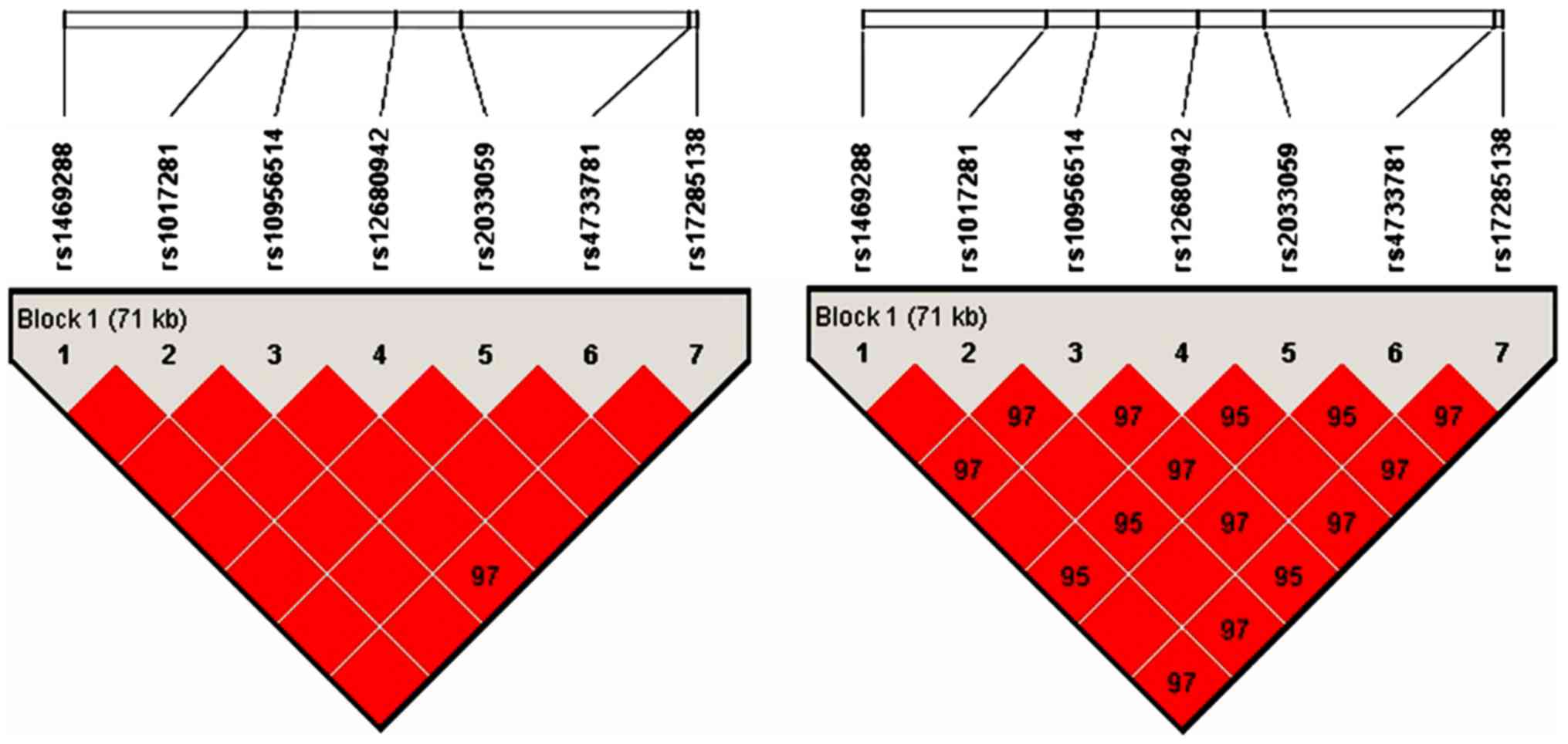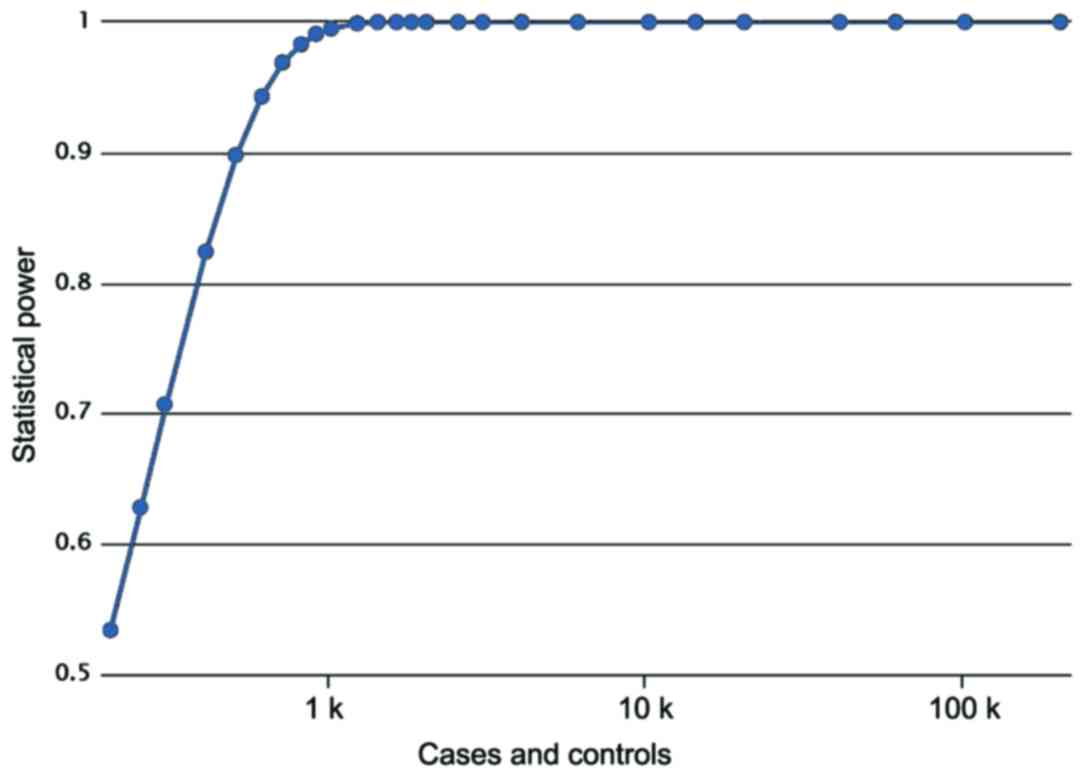|
1
|
Zumla A, George A, Sharma V, Herbert RH,
Oxley A and Oliver M: Baroness Masham of Ilton: The WHO 2014 global
tuberculosis report - further to go. Lancet Glob Health. 3:e10–e12.
2015. View Article : Google Scholar : PubMed/NCBI
|
|
2
|
National Technical Steering Group of the
Epidemiological Sampling Survey for Tuberculosis, . Implementing
Office of the Epidemiological Sampling Survey for Tuberculosis: The
prevalence of pulmonary tuberculosis in a national survey across
China in 2010. Zhonghua Jie He He Hu Xi Za Zhi. 35:665–668.
2012.(In Chinese). PubMed/NCBI
|
|
3
|
Li XX, Zhang H, Jiang SW, Liu XQ, Fang Q,
Li J, Li X and Wang LX: Geographical distribution regarding the
prevalence rates of pulmonary tuberculosis in China in 2010.
Zhonghua Liu Xing Bing Xue Za Zhi. 34:980–984. 2013.(In Chinese).
PubMed/NCBI
|
|
4
|
Wubuli A, Xue F, Jiang D, Yao X, Upur H
and Wushouer Q: Socio-demographic predictors and distribution of
pulmonary tuberculosis (TB) in Xinjiang, China: A spatial analysis.
PLoS One. 10:e01440102015. View Article : Google Scholar : PubMed/NCBI
|
|
5
|
Siroka A, Ponce NA and Lönnroth K:
Association between spending on social protection and tuberculosis
burden: A global analysis. Lancet Infect Dis. 16:473–479. 2016.
View Article : Google Scholar : PubMed/NCBI
|
|
6
|
Png E, Alisjahbana B, Sahiratmadja E,
Marzuki S, Nelwan R, Balabanova Y, Nikolayevskyy V, Drobniewski F,
Nejentsev S, Adnan I, et al: A genome wide association study of
pulmonary tuberculosis susceptibility in Indonesians. BMC Med
Genet. 13:52012. View Article : Google Scholar : PubMed/NCBI
|
|
7
|
Comstock GW: Tuberculosis in twins: A
re-analysis of the Prophit survey. Am Rev Respir Dis. 117:621–624.
1978.PubMed/NCBI
|
|
8
|
Varpela E: Studies on tuberculosis in
twins. Duodecim. 73:242–250. 1957.(In Finnish). PubMed/NCBI
|
|
9
|
Rubinstein U, Schachter J, Sharon N,
Talnir R and Amir J: Tuberculosis in a pair of twins - the use of
molecular biology methods for the detection of the source of
infection. Harefuah. 146:170–172, 248. 2007.(In Hebrew). PubMed/NCBI
|
|
10
|
Khor CC, Vannberg FO, Chapman SJ, Guo H,
Wong SH, Walley AJ, Vukcevic D, Rautanen A, Mills TC, Chang KC, et
al: CISH and susceptibility to infectious diseases. N Engl J Med.
362:2092–2101. 2010. View Article : Google Scholar : PubMed/NCBI
|
|
11
|
Garzón MC, Angée DY, Llerena C, Orjuela DL
and Victoria JE: Surveillance of Mycobacterium tuberculosis
resistance to antituberculosis drugs. Biomedica. 28:319–326.
2008.(In Spanish). View Article : Google Scholar : PubMed/NCBI
|
|
12
|
Ladefoged K, Rendal T, Skifte T, Andersson
M, Søborg B and Koch A: Risk factors for tuberculosis in Greenland:
Case-control study. Int J Tuberc Lung Dis. 15:44–49.
2011.PubMed/NCBI
|
|
13
|
Nie Z and Randazzo PA: Arf GAPs and
membrane traffic. J Cell Sci. 119:1203–1211. 2006. View Article : Google Scholar : PubMed/NCBI
|
|
14
|
Curtis J, Luo Y, Zenner HL,
Cuchet-Lourenço D, Wu C, Lo K, Maes M, Alisaac A, Stebbings E, Liu
JZ, et al: Susceptibility to tuberculosis is associated with
variants in the ASAP1 gene encoding a regulator of dendritic cell
migration. Nat Genet. 47:523–527. 2015. View Article : Google Scholar : PubMed/NCBI
|
|
15
|
Tien DN, Kishihata M, Yoshikawa A,
Hashimoto A, Sabe H, Nishi E, Kamei K, Arai H, Kita T, Kimura T, et
al: AMAP1 as a negative-feedback regulator of nuclear factor-κB
under inflammatory conditions. Sci Rep. 4:50942014. View Article : Google Scholar : PubMed/NCBI
|
|
16
|
Oda A, Wada I, Miura K, Okawa K, Kadoya T,
Kato T, Nishihara H, Maeda M, Tanaka S, Nagashima K, et al: CrkL
directs ASAP1 to peripheral focal adhesions. J Biol Chem.
278:6456–6460. 2003. View Article : Google Scholar : PubMed/NCBI
|
|
17
|
Nie Z, Hirsch DS, Luo R, Jian X, Stauffer
S, Cremesti A, Andrade J, Lebowitz J, Marino M, Ahvazi B, et al: A
BAR domain in the N terminus of the Arf GAP ASAP1 affects membrane
structure and trafficking of epidermal growth factor receptor. Curr
Biol. 16:130–139. 2006. View Article : Google Scholar : PubMed/NCBI
|
|
18
|
Hou T, Yang C, Tong C, Zhang H, Xiao J and
Li J: Overexpression of ASAP1 is associated with poor prognosis in
epithelial ovarian cancer. Int J Clin Exp Pathol. 7:280–287.
2013.PubMed/NCBI
|
|
19
|
Lin D, Watahiki A, Bayani J, Zhang F, Liu
L, Ling V, Sadar MD, English J, Fazli L, So A, et al: ASAP1, a gene
at 8q24, is associated with prostate cancer metastasis. Cancer Res.
68:4352–4359. 2008. View Article : Google Scholar : PubMed/NCBI
|
|
20
|
Sabe H, Hashimoto S, Morishige M, Ogawa E,
Hashimoto A, Nam JM, Miura K, Yano H and Onodera Y: The
EGFR-GEP100-Arf6-AMAP1 signaling pathway specific to breast cancer
invasion and metastasis. Traffic. 10:982–993. 2009. View Article : Google Scholar : PubMed/NCBI
|
|
21
|
Onodera Y, Hashimoto S, Hashimoto A,
Morishige M, Mazaki Y, Yamada A, Ogawa E, Adachi M, Sakurai T,
Manabe T, et al: Expression of AMAP1, an ArfGAP, provides novel
targets to inhibit breast cancer invasive activities. EMBO J.
24:963–973. 2005. View Article : Google Scholar : PubMed/NCBI
|
|
22
|
Bellamy R: Susceptibility to mycobacterial
infections: The importance of host genetics. Genes Immun. 4:4–11.
2003. View Article : Google Scholar : PubMed/NCBI
|
|
23
|
Hu X, Peng W, Chen X, Zhao Z, Zhang J,
Zhou J, Cai B, Chen J, Zhou Y, Lu X, et al: No significant effect
of ASAP1 gene variants on the susceptibility to tuberculosis in
Chinese population. Medicine (Baltimore). 95:e37032016. View Article : Google Scholar : PubMed/NCBI
|
|
24
|
Miao R, Ge H, Xu L, Sun Z, Li C, Wang R,
Ding S, Yang C and Xu F: Genetic variants at 18q11.2 and 8q24
identified by genome-wide association studies were not associated
with pulmonary tuberculosis risk in Chinese population. Infect
Genet Evol. 40:214–218. 2016. View Article : Google Scholar : PubMed/NCBI
|
|
25
|
Yim JJ and Selvaraj P: Genetic
susceptibility in tuberculosis. Respirology. 15:241–256. 2010.
View Article : Google Scholar : PubMed/NCBI
|
|
26
|
Barrett JC, Fry B, Maller J and Daly MJ:
Haploview: Analysis and visualization of LD and haplotype maps.
Bioinformatics. 21:263–265. 2005. View Article : Google Scholar : PubMed/NCBI
|
|
27
|
Delgado JC, Baena A, Thim S and Goldfeld
AE: Ethnic-specific genetic associations with pulmonary
tuberculosis. J Infect Dis. 186:1463–1468. 2002. View Article : Google Scholar : PubMed/NCBI
|
|
28
|
El Baghdadi J, Remus N, Benslimane A, El
Annaz H, Chentoufi M, Abel L and Schurr E: Variants of the human
NRAMP1 gene and susceptibility to tuberculosis in Morocco. Int J
Tuberc Lung Dis. 7:599–602. 2003.PubMed/NCBI
|
|
29
|
Perrin P: Human and tuberculosis
co-evolution: An integrative view. Tuberculosis (Edinb). 95 Suppl
1:S112–S116. 2015. View Article : Google Scholar : PubMed/NCBI
|
















